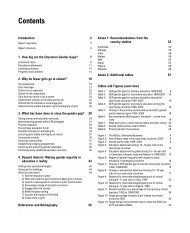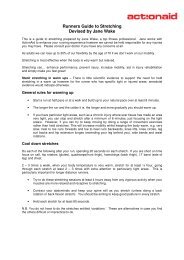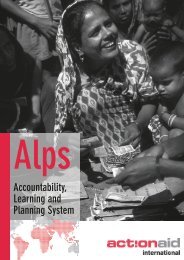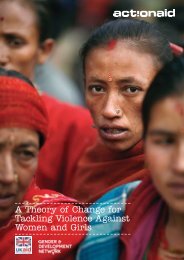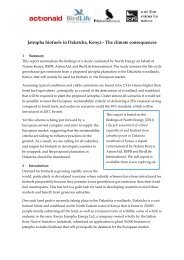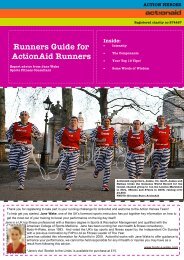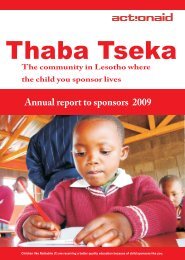common cause - ActionAid
common cause - ActionAid
common cause - ActionAid
Create successful ePaper yourself
Turn your PDF publications into a flip-book with our unique Google optimized e-Paper software.
08 SPECIAL REPORT<br />
SPECIAL REPORT 09<br />
A helping hand<br />
for India’s homeless<br />
FOR ONCE WE CAN<br />
SLEEP IN CALM AND<br />
SAFETY... NOW WE FINALLY<br />
HAVE A HOME<br />
<strong>ActionAid</strong> India has been working<br />
hard to address one of the country’s<br />
biggest problems: homelessness.<br />
But, with a little determination and a<br />
lot of effort, we are making headway,<br />
says KATHERINE HAYWOOD.<br />
PHOTO: KALPESH LATHIGRA/NB PICTURES/ACTIONAID UK<br />
In Lucknow, the capital of the north Indian state of Uttar<br />
Pradesh, at least 600 homeless people died as a result of the<br />
harsh winter of 2002/03. This winter there was a dramatic<br />
decrease in the number of deaths due, in part, to <strong>ActionAid</strong><br />
and partners’ success at forcing the state government to<br />
open up unused public buildings as night shelters.<br />
The campaign was based on the work of Dr Indu Prakash,<br />
the coordinator of <strong>ActionAid</strong>’s national homeless policy. Dr<br />
Prakash has been highly successful in opening up<br />
government buildings as shelters in Delhi, as part of his work<br />
with street children. This winter the work was rolled out to<br />
four new cities, one of which was Lucknow.<br />
Firstly, local organisations identified several vacant<br />
government buildings in areas where hundreds of homeless<br />
people were sleeping rough. Next, after vigorous lobbying by<br />
<strong>ActionAid</strong>, the municipal commissioner agreed to open six<br />
schools and disused buildings that had been lying vacant for<br />
up to ten years. <strong>ActionAid</strong> provided the homes with sheets,<br />
blankets, a caretaker and basic medical facilities.<br />
Residents soon flooded in. Almost all of them are migrant<br />
daily wage labourers in construction work and other physical<br />
activities, with families in the surrounding villages to support.<br />
Most have been homeless all of their adult lives, returning to<br />
their villages once a month.<br />
They earn as little as Rs 50 (65p) a day and, on average,<br />
get only 15 days of work a month. Due to the availability of<br />
cheap labour, they are often forced to work for under the<br />
minimum wage. Even so, their employers often refuse to pay.<br />
It is this type of employment insecurity and exploitation that<br />
the organisers of the shelters want to help combat. <strong>ActionAid</strong>’s<br />
Hanumant Rawat, Lucknow regional manager, says, “We<br />
organised a spontaneous campaign during 2002/03 and<br />
distributed blankets to those on the streets, but we realised<br />
this could never be a long term solution. We wanted to provide<br />
the homeless with more permanent shelter.”<br />
It has been a long battle – many of the shelters are still not<br />
perfect. Some have irregular water supplies or drainage<br />
problems. Others have structural deficiencies. Some people<br />
also found that the shelter isolated them from potential<br />
employers who pick daily wage labourers off the street.<br />
These are all problems that <strong>ActionAid</strong> hopes to address –<br />
but there is a general feeling that a crucial step has been<br />
ACTIONAID IS<br />
DETERMINED TO KEEP<br />
THE REMAINING FOUR<br />
SHELTERS IN LUCKNOW<br />
OPEN, AND EXTEND<br />
THEIR OPENING HOURS<br />
TO THE DAYTIME. THE<br />
RESIDENTS THEMSELVES<br />
SAY THEY HAVE NO<br />
PLANS TO MOVE<br />
OUR BIGGEST<br />
ACHIEVEMENT WAS<br />
INSISTING THAT THE<br />
HOMELESS THEMSELVES<br />
WERE AT THE FOREFRONT<br />
OF THIS CAMPAIGN. THEY<br />
RUN THE SHELTERS AND<br />
SET THE AGENDA<br />
made. Despite the onset of warm weather, the shelters are<br />
growing in popularity, with new arrivals each week.<br />
Yet, despite these obvious successes, the state<br />
government has started to close the shelters now the winter<br />
months are over.<br />
When asked about the closures, one local assistant district<br />
magistrate said, “We don’t see (the shelters) as a permanent<br />
solution.” He went on to claim that: “…most of the time these<br />
people like sleeping under the open sky”.<br />
But <strong>ActionAid</strong> is determined to keep the remaining four<br />
shelters in Lucknow open, and extend their opening hours to<br />
the daytime. The residents themselves say they have no plans<br />
to move. They like the newfound community that the shelters<br />
provide. “We enjoy living collectively,” says Dinesh, 47, from<br />
the Shramik Seva Ashram shelter. “Everyone helps each other<br />
out, like with money or advice. We are like a family.”<br />
And, at a time when religious conflict and hostility is on the<br />
increase in India, the shelters have managed to bridge<br />
divides. Muhammed Israel, 42, a Muslim in a predominantly<br />
Hindu shelter, says, “I feel completely welcome here. We<br />
even celebrate our religious festivals together.”<br />
Sandeep Khare, from local organisation Vigyan (which runs<br />
three of the shelters), wants to build on the community spirit<br />
the homeless shelters have created. “As a group, those living<br />
in the shelters are now more able to move forward on issues<br />
that affect their lives,” he says.<br />
Sandeep is working on mobilising the residents to demand<br />
the necessary renovation work on the buildings. It is early<br />
days yet, but the men of the shelters are already working as<br />
a group. In some shelters they have pooled their money for<br />
purchasing necessary communal items. Others have offered<br />
their skills and time to the renovations.<br />
“Our biggest achievement,” says Sandeep, “was insisting<br />
that the homeless themselves were at the forefront of this<br />
campaign. They run the shelters and set the agenda.”<br />
And it certainly seems to be working. “For once we can<br />
sleep in calm and safety,” says Dinesh. “Now we finally have<br />
a home.”<br />
If you would like to support our work<br />
in India, please visit www.actionaid.org.uk,<br />
call 01460 23 8000 or email<br />
<strong>common</strong><strong>cause</strong>@actionaid.org.uk quoting<br />
your supporter number or postcode.<br />
<strong>common</strong> <strong>cause</strong> SUMMER 2004 www.actionaid.org.uk<br />
www.actionaid.org.uk <strong>common</strong> <strong>cause</strong> SUMMER 2004




